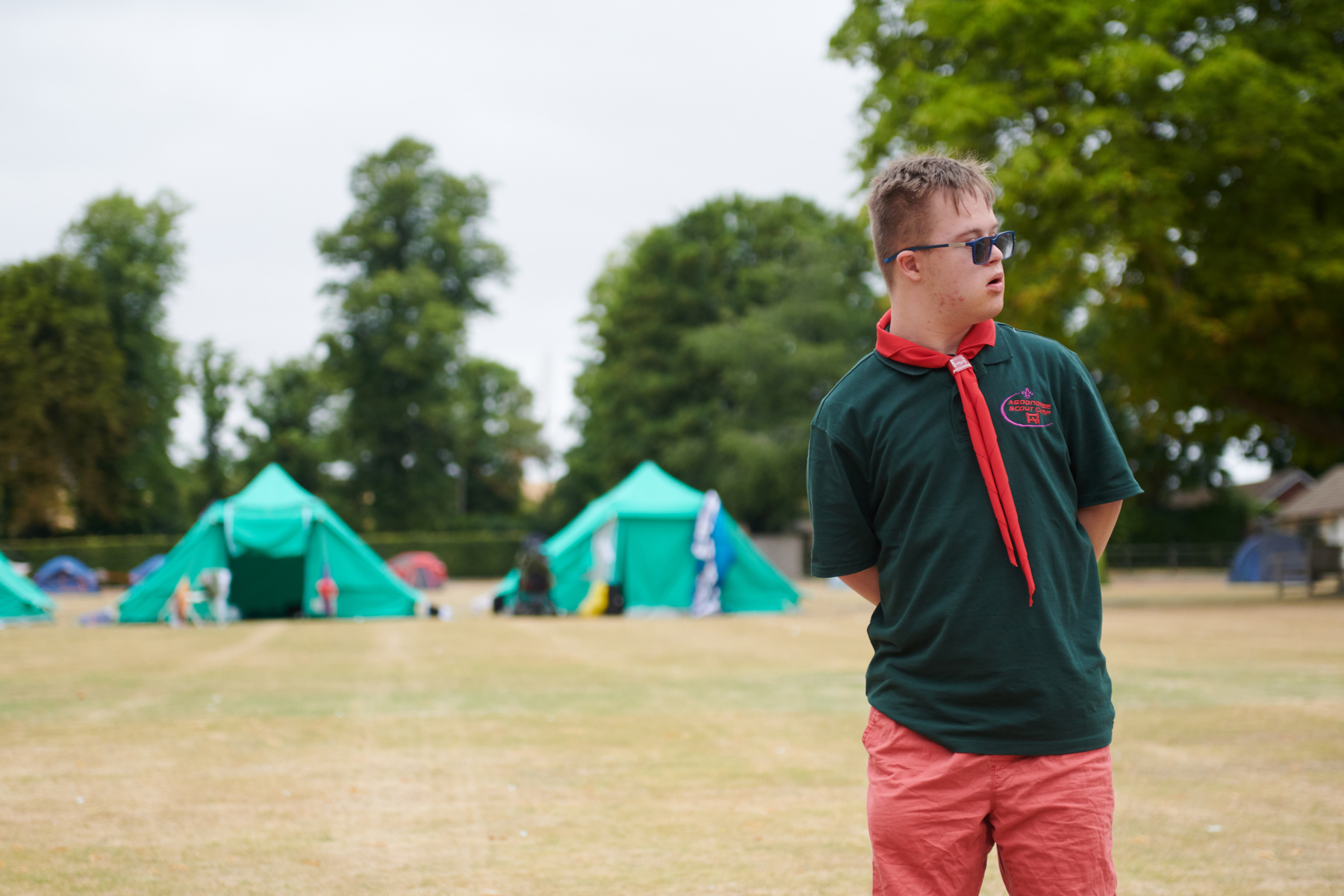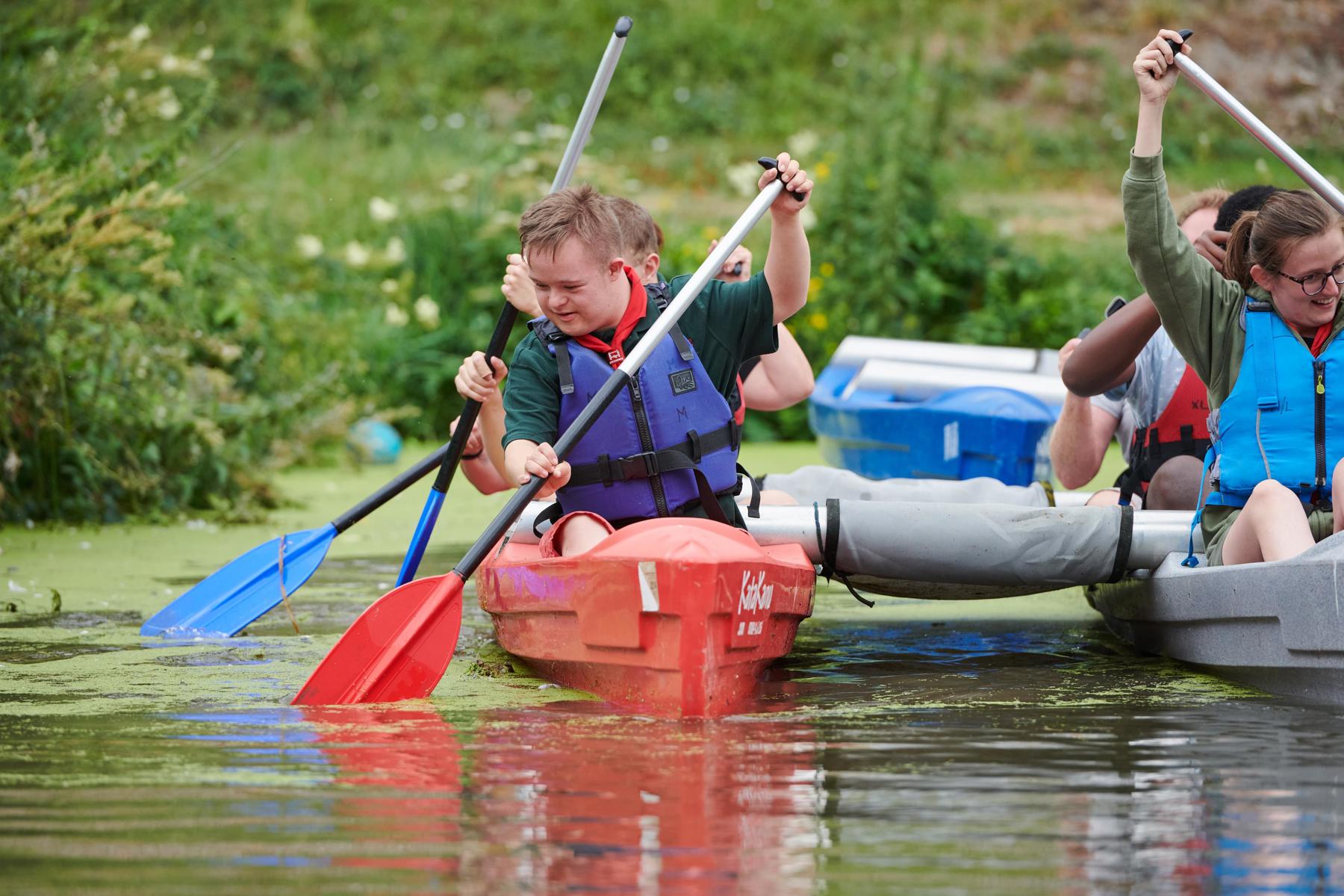12 ways to support people with learning disabilities in Scouts
For Learning Disability Week in June, we spoke to Mencap to find out their advice how to support people with learning disabilities in Scouts.
What's a learning disability?
Mencap are the leading charity for people with a learning disability. They say that the answer to what a learning disability is different for every person who has one.
They describe a learning disability as a reduced intellectual ability and difficulty with everyday activities. It’s a condition that affects someone for their whole life.
People with a learning disability may struggle with household tasks, socialising and managing money
They may also need longer to learn. They may need support to develop new skills, understand complicated information and interact with other people.

The difference between learning disabilities and learning difficulties
A learning disability is a permanent condition that’ll affect someone for their whole life.
It’s different from a learning difficulty, such as dyspraxia, ADHD or dyslexia. This’s because a learning difficulty doesn't affect general intellect.
People with learning disabilities can have a wide variety of abilities. A learning disability’s often classified as mild, moderate, severe or profound.
Supporting people with learning disabilities
Some people with a mild learning disability can talk easily and look after themselves. However, they might need a bit longer than usual to learn new skills. They might also find it harder to understand complex information.
Other people with learning disabilities may not be able to communicate at all. They may also be managing living with more than one disability (either a learning or physical disability).
Learning disabilities can’t be cured. However, we can empower people with learning disabilities to take part in activities.
To be able to do this depends on getting to know the individual well, identifying their strengths and finding out what support they need.

12 ways to support Scouts with learning disabilities
Here are our tips, created with Mencap, for making reasonable adjustments to support people with learning disabilities in Scouts.
If your group needs helping with funding, such as for ear defenders or fidget toys, you can apply for an Additional Needs grant.
Noise-cancelling headphones or ear defenders can help block out overwhelming noise and help the person to self-regulate.
Sunglasses/eye covers also allow them to escape from bright lights, which may be overwhelming.
Consider how you can shorten your sentences to support understanding and use visual images/signing to help with learning, memory, and understanding.
Using visual supports will explain expectations to young people, as well as help young people prepare to for activities, such as nights away.
For example, it may be useful to have visual, picture-based packing lists, so the young person can be involved in packing a bag, too.
Makaton is a form of sign language that uses symbols, signs, and speech to enable children, young people, and adults to communicate.
Makaton is flexible and can be used at any level appropriate to the person’s needs. However, many people stop using the signs and pictures as their speech develops.
Makaton is based on British Sign Language (BSL), and signs are always used alongside speech.
Using signs can help people who have no speech, or if their speech isn’t clear. Symbols, for example on picture cards, help those unable to sign, too.
Scouts have some resources you can use, such as the Promise and some keywords that you may need. You can even learn the Scout promise in Makaton.
The Makaton charity offers free resources, such as a ‘sign of the week.’ You can find out more on the Makaton charity website.
You can get grants to fund Makaton courses for your leadership team through our Additional Needs grant.
You can also take part in our Inclusion Learning and Training.
The programme in Scouts contains a great deal of flexibility. The guiding principle throughout the programme should be that young people are being challenged, while having fun.
Each young person who participates in the programme should face a similar degree of challenge. Volunteers can tailor badge or award requirements according to each young person's abilities, to enable all young people to work towards the badge or award of their choice.
During meetings, camps and events, remember to use simpler language to explain activities and badge requirements.
Similarly, offer support for activities where the group undertaking fine motor tasks, such as colouring in, cutting out or washing up. Consider what equipment might provide support, or whether doing activities with a buddy may help.
People with learning disabilities often have difficulties with fine and gross motor skills. Difficulties with fine motor skills, or skills of the hands, can include:
- Trouble using scissors
- Holding pencils and paint brushes
- Tying shoelaces
- Using a fork, spoon or knife
- Holding a book and so on.
There’s a lot of flexibility in Scouts and in the programme to make sure all young people can enjoy the adventure. This includes flexibility in badges and awards. Read more information about flexibility in Scouts.
Keep in mind that a young person may need supervision and encouragement to stay on a task.
If the young person needs additional adult support, discuss this with their parent/carer – could they help in some sessions, or would it be beneficial for the group to look at trying to recruit additional support for them?
You can also use the Additional Needs grant to help fund translators and signers for large events, so everyone can be included.
Everyone is different, so don’t make assumptions. For example, one misconception of people with Down’s Syndrome is that they’re always loveable and affectionate.
Remember to adapt your expectations of the individual by using your knowledge of them, rather than relying on your assumptions, or experience of others of the same age. If you’re not sure, ask them, or in the case of young people, speak to their parent/carer.
Leaders should follow best practice around physical contact and always refer to the Yellow Card.
It’s vital to speak about issues relating to Down’s syndrome in a way that’s both factually accurate and inoffensive. Be considerate to people who have Down’s syndrome, their families, carers, and the people who support them. You can learn more about terminology from the Down’s Syndrome Association.
Make sure your programme is planned with all members’ needs in mind. You’ll need to be aware of the concentration span required, and the complexity of the activities.
Look at the ‘Make it accessible’ section of the Scouts activities on the Activity Finder to see how you can adapt the game or activity.
You can find out more about making Reasonable Adjustments.
Talk to the young person and their parent/carer about any physical and medical needs. Make sure these are recorded on their support plan, so all adults are aware of needs and how to support them.
Use the Parent/Carer Framework to help frame your conversation, and be positive talking about strengths and interests, too.
Learn from the individual and be guided by their individual needs. You can do this by maintaining a positive relationship with parents/ carers, keeping them informed of the young person's progress, and looking to them for specialist guidance.
For young people with a learning disability, it may be beneficial to ask if you can approach their school to get any further tips.
Be aware of what’s going on at all times, and don’t assume instructions that are given once will be understood or remembered.
Due to possible hearing difficulties, you should make sure instructions are given clearly, simply, and face-to-face. Take a look at the advice for supporting individuals with hearing loss.
Consider how you can shorten your sentences to support understanding, such as using simpler language to explain activities and badge requirements and using visual images/signing to help with learning, memory and understanding.
Be patient and always listen carefully. Make sure opportunities are given for any attempt to answer questions. You could create some simple questions at the level appropriate for the young person, so they always feel involved and able to contribute in activities.
For some activities, working in pairs or larger groups, rather than individually, may help overcome difficulties.
Some environments can be overwhelming, especially for those with a learning disability.
Sometimes, people with learning difficulties may have sensory differences. This means that any of their senses may be over- or under-sensitive, or both, at different times.
These sensory differences can affect how they feel and act, as well as have a big impact on their life. This means that some of their daily activities might be affected. These could include things such as:
- Hair cutting
- Teeth brushing
- Moving around
- Leisure activities
- Having a shower
- Eating and drinking
- Going to school or college
- Shopping
You could create a quiet, designated space that young people and adults can use when they feel overwhelmed and overloaded due to sensory differences.
It gives people time and space to calm their sensory systems and take control of their emotions again.
You could choose calming colours, such as shades of blue or green.
Use comfortable decor, such as large fluffy cushions and soft blankets, to create a calming and cosy atmosphere. You could have a variety of soft toys to hug.
You could make a box or bag with stress balls, calming shaker bottles, small puzzles, and fidget toys in.